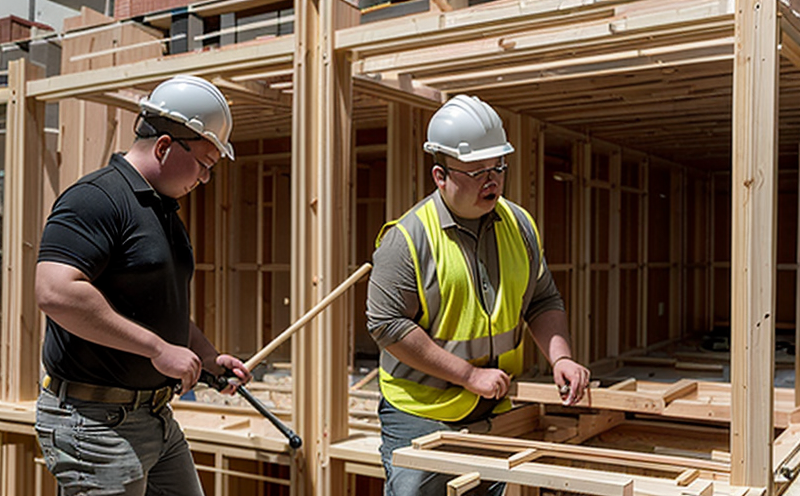Testing the impact of density on the overall weight and load-bearing capacity of construction materials
Unlocking Optimal Construction Materials The Crucial Role of Density Testing
In the construction industry, ensuring that building materials meet specific weight and load-bearing capacity requirements is paramount to preventing structural failures and ensuring public safety. One critical aspect of achieving this goal lies in understanding the impact of density on the overall performance of these materials. This is precisely where Testing the Impact of Density comes into play a specialized laboratory service offered by Eurolab that offers businesses unparalleled insights into their construction materials.
The Why Behind Testing Density
Materials density, typically measured in grams per cubic centimeter (g/cm³), influences not only its weight but also its load-bearing capacity. A material with high density tends to be heavier and stronger than one with low density, assuming equal volume. Conversely, understanding the relationship between these two properties is essential for architects, engineers, builders, and construction companies looking to optimize their building designs.
Advantages of Using Testing the Impact of Density
Eurolabs service is more than a mere laboratory test; it is an indispensable tool for businesses aiming to enhance their projects safety and efficiency. Here are some of the key benefits associated with this testing
- Informed Decision Making With detailed reports from Eurolab, construction companies can make informed decisions regarding the choice of materials based on their load-bearing capacity and weight.
- Enhanced Safety Standards By understanding the properties of materials at a molecular level, businesses can minimize the risk of structural failures that could lead to accidents and costly repairs.
- Optimized Material Usage The precise measurement of density allows for the efficient use of resources. Materials that meet exact specifications ensure no waste or overuse, contributing to environmental sustainability.
- Compliance with Regulations Testing at Eurolab ensures that all materials used comply with local building codes, preventing legal and financial penalties associated with non-compliance.
- Cost Savings By using only what is needed, businesses can significantly reduce their material costs, which translates into substantial savings in the long run.
How Does Eurolabs Testing Work?
Eurolabs process is designed to be both efficient and precise. Upon receiving a sample of construction material, our experts conduct comprehensive testing that includes
- Density Measurement Utilizing advanced equipment for accurate density measurement.
- Load-Bearing Capacity Tests Conducted in controlled laboratory environments to simulate real-world scenarios.
- Material Analysis Detailed examination of the chemical composition and structure of the materials.
Each test is carefully documented and presented in a clear, actionable report that serves as a valuable resource for our clients. This detailed information empowers them with the knowledge needed to select the best materials for their projects.
Frequently Asked Questions (FAQs)
- Q What types of construction materials can be tested?
A Eurolab offers testing services for a wide range of materials, including concrete, steel, wood, and various composites.
- Q How long does the testing process typically take?
A The duration of testing varies depending on the type of material and tests conducted. However, our standard reports are usually delivered within three to five business days after sample receipt.
- Q Are your testing methods compliant with industry standards?
A Yes, Eurolab adheres strictly to all relevant international and national standards for testing construction materials, ensuring that our results are universally accepted by professionals in the field.
Conclusion
In the dynamic world of construction, where safety and efficiency are paramount, understanding the impact of density on building materials is no longer a luxury but a necessity. Eurolabs service offers unparalleled insights into the properties of your construction materials, empowering you with the knowledge to optimize your projects, ensure public safety, and comply with local regulations.
For businesses looking to elevate their construction standards and stay ahead in an increasingly competitive market, Testing the Impact of Density is more than a laboratory test its a strategic investment. By choosing Eurolab, youre not just getting a service; youre gaining a partner dedicated to your projects success.
-
Testing the mass per unit volume of construction materials to determine their density
-
Evaluating the density of materials like concrete, metals, and composites for their suitability in construction
-
Simulating different temperature conditions to assess how density is affected by environmental changes
-
Testing the density of materials to verify their strength and structural integrity
-
Verifying the consistency of material density for uniformity in production and quality control
-
Assessing how the density of materials influences their thermal conductivity and insulation properties
-
Ensuring that materials with specific density requirements, such as for fire resistance or insulation, meet industry standards
-
Simulating material conditions under extreme temperature and pressure to see how density affects performance
-
Testing materials like insulation and foam for lightweight and effective density performance
-
Verifying the density of materials used for floors, walls, and ceilings to ensure stability and structural strength
-
Testing for variations in density that could impact the material’s structural properties or performance
-
Evaluating the effect of density on materials’ acoustic properties and soundproofing qualities
-
Testing for how variations in density can impact the thermal expansion of materials in construction
-
Assessing the relationship between density and the material’s ability to absorb impact or stress
-
Verifying the consistency of material density across different batches for reliable performance in construction
-
Simulating how high-density materials behave under pressure compared to lower-density materials
-
Testing the impact of moisture absorption or other environmental factors on the density of construction materials
-
Verifying that materials used for structural support meet the required density for optimal strength
-
Testing how the density of materials like wood, cement, or steel influences their strength and performance in construction
-
Assessing the relationship between material density and durability in extreme environmental conditions
-
Ensuring that materials with low density, such as lightweight aggregates, provide sufficient strength for construction applications




